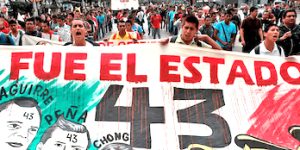Communist education will end wage slavery here ♦ Talking about communism with a co-worker here ♦ “Capitalocene,” not “Anthropocene” here ♦ here

“IT WAS THE STATE!”
Communist Education, Not Capitalist Education, Will End Wage Slavery
The “New Mexican School” is a project of the López Obrador government. One of its commitments is to provide “quality education” according to the production needs of capitalism.
Educating ourselves about communism means promoting the liberation of wage slaves. Neither schools nor government books will do that. This education includes distributing Red Flag and joining the International Communist Workers’ Party (ICWP).
One bosses’ camp says the new textbooks promote communism. Their opponents, the government advocates, say “I didn’t find anything about communism there.” As if the liberation of wage slaves is a bad thing. As if it’s good that textbooks don’t promote it.
The books focus on gender and anti-racism, in line with the Sustainable Development Goals in the UN Agenda 2030. They remark on the “community character” of the learning process. “Learning communities” is a concept promoted by the UN and related governments. They intend the term “community” to promote unity of interests. However, humanity is divided into social classes even in the farthest corners of the world.
Section 22 of education workers in Oaxaca, Mexico declared in August that it will not use the textbooks distributed by the federal government. In December 2022, it said that the federal and state governments should pay attention to the efforts of Section 22, which is affiliated with the CNTE (National Coordinating Committee of Education Workers). CNTE opposes the SNTE union leadership.
The Plan for the Transformation of Education in the State of Oaxaca (PTEO) considers the communal, cultural, and regional context of the students there. In 2012, it promoted the participation of some 70,000 school workers (including 52,000 teachers) in Oaxaca and an important group of intellectuals.
Oaxaca has high levels of marginalization. It’s home to fifty-three percent of Mexico’s indigenous population. Twenty-one percent of the population can’t read and write. Twenty-six percent of the female population is illiterate.
The PTEO promotes regionalism in addition to nationalism. A sponsoring group refers to “epistemologies of the south” or “de-colonials.” It emphasizes the differences among workers of different “ethnicities” rather than the similarities of exploitation and oppression.
It spreads the idea that illegal theft must be fought. But it does not talk about legal theft: the surplus value extracted from wage and non-salaried workers. Workers are encouraged to believe that the capitalist state defends them.
We spread communist education through Red Flag in schools and communities. We invite school workers and teachers to join the communist struggle for real learning about the liberation of our international working class.
—Teacher in Mexico
Read our Pamphlet “Communist Education for a Classless Society” here
Talking about Communism with a Co-worker
“These things happen very often in Mexico,” said a co-worker in Los Angeles (USA). “The culprit is the state. Those of us who are indigenous people are nothing to them.”
He was referring to the fact that September 26th was the 9th anniversary of the capture, kidnapping, and disappearance of 43 students from Ayotzinapa, Mexico.
I told him, “It’s not only in Mexico. It is something that capitalism does worldwide to stop the masses from rising up against their system. But that is something they will not be able to avoid. As this continues, the masses are changing their way of seeing the world and are blaming capitalism directly.”
“But that will continue to happen. It will never end. There will always be deaths and disappearances at the hands of governments,” my co-worker answered.
I said, “The only way that all the evils of capitalism will end is by organizing and fighting for communism.”
Laughing and joking, he said, “You’re going to talk about communism again.”
Other co-workers also knew about the 43 disappeared students. But they were not interested in talking about it, except for this friend, with whom I had a good discussion.
I invited him to the next meeting of our collective where we will watch a movie, eat, and talk about our political ideas.
—Young Comrade
Read our article: Ayotzinapa, Mexico: It Was the State
“Capitalocene,” not “Anthropocene”
Dearest Red Flag,
I have only one real criticism of The History of the Earth and the Future of Communism. It is the use of the term “Anthropocene” to describe the environmental consequences of the white colonial sickness alone.
Humans cannot be said to all have the same relationship with their environments. The article associates bleak imagery with a term meant to describe the environmental effects of all human behavior. This serves to further cement the idea that the well-being of humans is fundamentally at odds with that of nonhuman life. This erases indigenous ways of life that work with, rather than against, their environments.
But this cultural alienation from (re: ‘invention of’) Nature is what excuses and inspires the same environmental abuse, neglect, and destruction that this article points to.
This connection between social and ecological health serves as one of nine guiding principles for the work of Climate Alliance of the South Sound. As part of our continuous study practice, we are currently reading “A History of the World in Seven Cheap Things”. The author suggests instead calling this epoch the “Capitalocene” to describe the profit-driven maladies of our world today. This recognizes the respectful relationships held with the environment by indigenous peoples past and present.
Thanks for holding space!
Shapes


